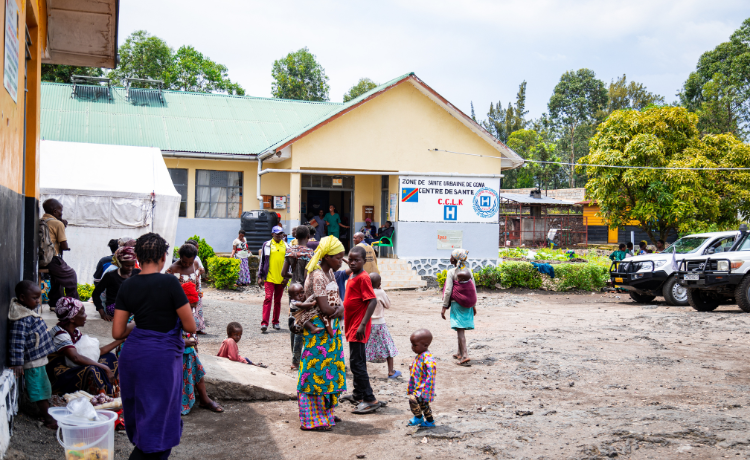News
A chance encounter leads to critical maternal care in the Democratic Republic of the Congo
- 04 April 2025
News
NORTH KIVU PROVINCE, The Democratic Republic of the Congo – Chance Azina walked slowly along the streets of Goma in North Kivu Province, her body weighed down by the heat at seven months pregnant. Like many others, she was trying to maintain a sense of normality, despite having been displaced multiple times by the intense violence flaring across the eastern Democratic Republic of the Congo.
What Ms. Azina didn’t know was that without urgent healthcare, both her pregnancy and childbirth could also hold deadly consequences.
Around the next corner she met Amani, a community outreach worker at the Kyeshero Christian Centre for the Light health facility, who was speaking with passersby to raise awareness about the reproductive health services available.
“When he asked me about headaches and leg pain, I was scared. That's exactly what I had been feeling,” Ms. Azina told UNFPA, the United Nations sexual and reproductive health agency, which supports the facility.
She quickly went for a check-up, receiving free care from midwives trained and supported by UNFPA. “She suffered intense headaches and leg pain, but hadn’t been seen by a health worker since the beginning of her pregnancy,” explained Justine, one of the midwives. “We immediately performed tests to rule out any risk of preeclampsia.”
Antenatal care had been impossible to find amid the violence that has forced hundreds of thousands to flee in terror. As her village of Kanihi, in the Masisi territory, came under attack in December 2024, Ms. Azina and her four children walked over 90km to reach the Bulengo displacement camp. But they were evicted when multiple sites hosting displaced people were dismantled by opposition forces in February. The family moved with thousands of others to yet another camp. Eventually, a host family offered to let her and her children share their small room in Kyeshero. And since her husband disappeared a few months ago, she has faced her fragile pregnancy alone.
A reality shared by thousands of women
![Two midwives in bright pink scrubs attend to a pregnant woman lying on a hospital bed]](/sites/default/files/inline-images/Untitled%20design%20%28100%29.png)
In the eastern Democratic Republic of the Congo, access to reproductive health services was scarce even before the latest crisis, and the country has one of the highest rates of maternal deaths. Now in North and South Kivu, just three hospitals are still operating, all of which are overwhelmed and lacking critical supplies, staff, electricity and fuel for ambulances. This means many women are compelled to deliver at home, without help.
Now in North and South Kivu, just three hospitals are still operating, all of which are overwhelmed
Reports show that fewer than half of pregnant women can attend the recommended minimum of four prenatal visits; of those who do, their first visit often comes too late to prevent complications. Even fewer are aware of danger signs, such as being underweight, anaemic, having hypertension and severe headaches – all of which could indicate life-threatening complications.
Before meeting Amani, Ms. Azina was unaware that the pain felt could cost her life and that of her baby.
“Many women feel they can no longer receive help after leaving the camps,” explained Dr. Solange N. Ngane, who works with UNFPA in North Kivu. “Our community workers play a vital role in raising awareness and providing guidance to the most vulnerable women."
UNFPA’s community-based approach identifies, informs and refers pregnant women to partner health facilities for prenatal consultations, family planning, and to treat survivors of sexual violence. This allows the most left behind to be reconnected to the healthcare system, even outside of the displacement camps.
An adapted and sustained response

Since February 2025, UNFPA has deployed 120 midwives and 360 community workers across Goma to ensure uninterrupted services and reduce maternal and newborn deaths.
As Ms. Azina continues her regular checkups, she is more aware of risks and where to seek help in an emergency. “I thought I would have to give birth alone, like the other times,” she said. “I didn't know help was still available – it was the young man I met on the street who saved my life.”
Ms. Azima is proof that even as a conflict spirals, a single piece of information or a listening ear can be enough to save lives. Across the country, UNFPA continues to raise awareness, provide reproductive health kits, strengthen referral systems for obstetric emergencies, and operate safe spaces for survivors of gender-based violence.
The United States has been a crucial and generous donor to these programmes, but recent terminations of funding will affect some 11 million people – more than 3 million in North Kivu alone – as partners are forced to cut back operations in what was already one of the world’s most underfunded crises. Mobile health clinics have also been suspended in several areas due to insecurity, and the highest levels of acute hunger ever recorded in the country mean that women and girls – especially those pregnant and new mothers – are facing even greater threats to their lives.
UNFPA is urgently calling for US$18 million from February to August 2025 to sustain life-saving interventions and protect the most vulnerable populations in North and South Kivu.